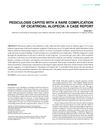 January 2003 in “American Journal of Clinical Dermatology”
January 2003 in “American Journal of Clinical Dermatology” In 2002, various skin reactions were reported due to different drugs, including allergies, hair loss, skin lesions, and other skin conditions.
 3 citations,
June 2020 in “Open access rheumatology”
3 citations,
June 2020 in “Open access rheumatology” A patient with Rhupus was diagnosed with Rowell syndrome and treated with various medications.
 February 2024 in “Skin health and disease”
February 2024 in “Skin health and disease” Many popular skincare products claim to prevent aging but lack strong evidence to prove their effectiveness and safety.
October 2018 in “Dermatologic Surgery” 1 citations,
January 2023 in “International journal of medical science and clinical research studies” Treating stubborn hair loss involves both medical and emotional support options.
4 citations,
November 2015 in “Hanbang an'i'bi'in'hu pibu'gwa haghoeji” Finasteride, Dutasteride, and Minoxidil are effective for hair growth, while new treatments like laser therapy and PRP show promise with few side effects.
 3 citations,
August 2017 in “PubMed”
3 citations,
August 2017 in “PubMed” A man got a scalp infection from synthetic hair implants because the procedure wasn't done by a doctor and was poorly managed.
 49 citations,
November 1992 in “Archives of dermatology”
49 citations,
November 1992 in “Archives of dermatology” Different treatments for alopecia areata have varying success rates and side effects; intralesional steroids are most effective.
 January 2012 in “Springer eBooks”
January 2012 in “Springer eBooks” Lupus can cause different skin problems, and treatments like quitting smoking and using certain creams or medicines can help.
 44 citations,
April 2006 in “Expert opinion on drug safety”
44 citations,
April 2006 in “Expert opinion on drug safety” Gefitinib can cause skin problems, diarrhea, and nausea, but rarely causes severe lung disease or hair loss.
 December 2013 in “Biomedical and biopharmaceutical research”
December 2013 in “Biomedical and biopharmaceutical research” Nanotechnology shows promise for better drug delivery and cancer treatment.
 April 2023 in “Dermatology practical & conceptual”
April 2023 in “Dermatology practical & conceptual” Tacrolimus solution is effective and well-tolerated for treating inflammatory scalp conditions.
 January 2018 in “International Journal of Medical Reviews and Case Reports”
January 2018 in “International Journal of Medical Reviews and Case Reports” A 6-year-old girl with head lice developed scarring hair loss but improved with treatment.
 13 citations,
April 2020 in “Dermatology and therapy”
13 citations,
April 2020 in “Dermatology and therapy” Cyclosporine combined with corticosteroids is more effective for severe alopecia areata than cyclosporine alone.
14 citations,
January 2019 in “PubMed” Vitamin D might be involved in the development of alopecia areata and could help in its treatment.
 20 citations,
July 1990 in “Journal of the American Academy of Dermatology”
20 citations,
July 1990 in “Journal of the American Academy of Dermatology” Captopril may cause hair loss, as shown by a woman's hair regrowing after stopping the medication.
 January 2025 in “SKIN The Journal of Cutaneous Medicine”
January 2025 in “SKIN The Journal of Cutaneous Medicine” Calcipotriol's effectiveness for treating alopecia areata is unclear and needs more research.
2 citations,
June 2024 in “Journal of Clinical Medicine” Alopecia Areata can affect nails, often improving on its own, but JAK inhibitors may help.
 48 citations,
January 2017 in “Skin Pharmacology and Physiology”
48 citations,
January 2017 in “Skin Pharmacology and Physiology” Finasteride-loaded nanoparticles may help treat alopecia.
 50 citations,
March 2000 in “American Journal of Clinical Dermatology”
50 citations,
March 2000 in “American Journal of Clinical Dermatology” Alopecia Areata has no guaranteed treatment for hair regrowth, but options like corticosteroids and minoxidil are used, with future research focusing on genetic and immune therapies.
 18 citations,
January 2017 in “Postępy Dermatologii i Alergologii”
18 citations,
January 2017 in “Postępy Dermatologii i Alergologii” EGFR inhibitors can cause various skin issues during cancer treatment, and managing these is important for patient care.
 1 citations,
January 2015 in “Side effects of drugs annual”
1 citations,
January 2015 in “Side effects of drugs annual” The document concludes that various dermatological treatments and drugs can cause skin reactions and side effects.
 94 citations,
September 2014 in “Therapeutic Delivery”
94 citations,
September 2014 in “Therapeutic Delivery” Nanoparticles can improve skin treatments by better targeting hair follicles, but more research is needed for advancement.
 January 2016 in “Springer eBooks”
January 2016 in “Springer eBooks” Cryotherapy may be an effective and simple treatment for mild hair loss with few side effects.
14 citations,
March 2019 in “European journal of pharmaceutics and biopharmaceutics” Proretinal nanoparticles improve skin absorption and reduce irritation of topical retinoids.
 January 2007 in “Elsevier eBooks”
January 2007 in “Elsevier eBooks” Alopecia areata is a reversible, autoimmune-related hair loss that can have significant emotional impact and uncertain treatment effectiveness.
 December 2012 in “Drugs & Therapy Perspectives”
December 2012 in “Drugs & Therapy Perspectives” Doctors use their experience to choose treatments for scarring hair loss because it's hard to diagnose and treat.
 1 citations,
May 2022 in “Archiv Euromedica”
1 citations,
May 2022 in “Archiv Euromedica” Topical treatment is recommended for Folliculitis decalvans in pregnant women.
 20 citations,
March 1985 in “Journal of The American Academy of Dermatology”
20 citations,
March 1985 in “Journal of The American Academy of Dermatology” Genetic factors alone might not cause pemphigus vulgaris; other factors like birth complications and puberty may trigger it.
 36 citations,
June 2019 in “eLife”
36 citations,
June 2019 in “eLife” The study developed a tool to predict how gut microbes process foods and drugs, showing that similar compounds often share metabolic pathways and effects.
























